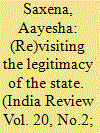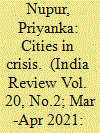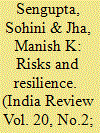|
|
|
Sort Order |
|
|
|
Items / Page
|
|
|
|
|
|
|
| Srl | Item |
| 1 |
ID:
179569


|
|
|
|
|
| Summary/Abstract |
The spread of the novel coronavirus that took over the world by a storm has caused a serious rupture in the social and economic order. As the Indian state is confronted by several challenges, the exodus of migrant labor appears as a gruesome spectacle. The already precarious lives of migrant labor owing to their employment in the informal economy has been amplified manifold with the outbreak of the pandemic. The eclipsed response of the state to acknowledge their misery has further exacerbated the problem. Since the state is entrusted with the responsibility of providing social security to the labor in the informal economy- a component that is also deemed necessary to be fulfilled by those the state seeks to govern, the pandemic has rendered the question of state’s legitimacy to be probed further. Defined as the capacity and the right to rule, the legitimacy of the state is analyzed from the perspective of the effective provision of social security schemes as well as the expedition/suspension of labor rights. While the state may possess the capacity to provide for social security, and it certainly does as is evident from its boisterous declarations of fiscal stimulus’ for labor welfare, it is argued that the state’s blatant lack of willingness to translate its promises into concrete action puts the “right to rule” aspect under scrutiny and its legitimacy under jeopardy.
|
|
|
|
|
|
|
|
|
|
|
|
|
|
|
|
| 2 |
ID:
179567


|
|
|
|
|
| Summary/Abstract |
The push for digital technologies during the Covid-19 pandemic has put a question mark on the relationship between the state and society in India. In particular, it has highlighted the gap between the lofty promises of digital welfare by political leaders and businesses, and the widespread discontent with digitalization as evident on the ground. In this paper, I take this gap as a starting point to conceptualize the nature of politics in the data state, drawing on Polanyian themes to understand how the contentions are gradually “embedding” the digital economy in society. Tracing the arc of the interactions between domestic ideas, interests and institutions alongside the development of digital capitalism, I also show that caught in these entanglements, digital economy can no longer remain a one-way street for data “extraction”. More specifically, I argue that at the end of its first decade of since the emergence of surveillance capitalism in 2010s, politics has ensured that it confronts ground level resistance that revolves around themes of inclusion, welfare and pluralism rather than the liberal conceptions of privacy and individual consent.
|
|
|
|
|
|
|
|
|
|
|
|
|
|
|
|
| 3 |
ID:
179571


|
|
|
|
|
| Summary/Abstract |
The Covid-19 pandemic and the subsequent migrant crisis has exposed and magnified the cracks in the politico-economic arrangements of our cities. Going beyond the pandemic, however, the article argues that the crisis is rooted in the manner in which our cities have been imagined, planned, and developed under the modernist paradigm and further guided by the neoliberal framework. The problems that have surfaced today have been always present but been brushed aside or given symptomatic treatment in the governance and policy sphere. Engaging with the planning and its interrelated dynamics in Delhi from a social justice perspective, the article explores the imagination of the city as formulated over the years through urban planning, how it impacts the integration of the migrant labor in the city and how the state capacity is central to these questions.
|
|
|
|
|
|
|
|
|
|
|
|
|
|
|
|
| 4 |
ID:
179563


|
|
|
|
|
| Summary/Abstract |
The challenge that the COVID-19 pandemic has posed to the extant socio-economic and political system had created a degree of disjunct that may be more difficult to reconcile without significant paradigmatic and concomitant policy change. While this question applies to the entire world, the present special issue is focused on rethinking some select facets of these questions in the Indian context. In doing so, the papers presented here locate the crisis that has been exacerbated by the pandemic in the longer contextual experience of their relevant area and reflect on some possibilities for the post-COVID-19 era.
|
|
|
|
|
|
|
|
|
|
|
|
|
|
|
|
| 5 |
ID:
179566


|
|
|
|
|
| Summary/Abstract |
The liberal democratic state exercises power through an element of governmental rationality, and police and the reason of the state constitute this rationality. The reason of the state and the regulation of individual conduct in a pandemic gives primary importance to the idea of public safety. Here, public order takes precedence over law enforcement, where law enforcement is geared to meet only one end, i.e., public safety. This paper argues that during a pandemic, the police creates different kinds of governmental order by stressing on security and public safety as an essential requirement. In doing so, the police form public safety as a reason or an element of state’s rationale for enforcing laws, thereby curtailing individual rights and liberties. The paper demonstrates how police can transform the rule of law into the rule of order within the state by changing law enforcement techniques to maintain a stable political order.
|
|
|
|
|
|
|
|
|
|
|
|
|
|
|
|
| 6 |
ID:
179570


|
|
|
|
|
| Summary/Abstract |
The current situation across the globe has made us reflect on state and Government during emergency times. Series of questions have raised about the governance aspect of organizations associated with the management of COVID-19. Based on this context, this article argues that the idea of governance lacks human-centric values and this has impacted the functionality aspect of governance, especially at the time of the novel coronavirus outbreak. Discrepancies in different tiers of the governance system resulted in producing health-related stigmas and discriminatory behaviors toward particular sections of the population like the migrant people. It suffices the need for recasting in the concept of governance concerning pandemic. The study further taking instances from Assam based on primary and secondary sources tries to show the loopholes in state-level governance functionality in terms of providing care during the health crisis. Moreover, it will look into the possibilities of a more efficient form of governance where the potentiality of Panchayati Raj institutions (PRIs) in bringing care and trust at the community level will be explored.
|
|
|
|
|
|
|
|
|
|
|
|
|
|
|
|
| 7 |
ID:
179568


|
|
|
|
|
| Summary/Abstract |
The advancement of technology, the expansion of global networks, and the shift from print media to digital and social media have brought in a drastic change to human lifestyle. With the shrinking of the world because of the advancement of technology, identities get mutated and transformed according to the need. The development of modern societies denotes how the “self” has become a “reflexive project” where individuals construct identities mediated by symbolic materials. It is through the culture of media that people forge their identities by shaping their political views and social behavior. As such, this article is an attempt to analyze how the pandemic has brought a “new normal” to our lives. With months of lockdown, changing work spaces, education, lifestyle- habits, and priorities, each one of us has shifted to a visually imagined community, which not only marks a paradigmatic shift from the print culture to a new era of visual culture, but also reshapes the socio-cultural imagination dominated by media and visual images. Furthermore, delving in the question of surveillance, this article highlighting the Indian context, also aims to evaluate the functioning of a multicultural liberal state, and its constant struggle with the politics of power and identity.
|
|
|
|
|
|
|
|
|
|
|
|
|
|
|
|
| 8 |
ID:
179565


|
|
|
|
|
| Summary/Abstract |
Disasters and crisis are becoming more complex with deadly cascading effects. The current coronavirus pandemic is viewed as the newest form of health and socio-economic crisis that has disrupted the flow of normal life for millions. Viewing the pandemic as a unique or unpredictable occurrence shifts responsibility and accountability from a host of institutional actors to those who were unable to protect themselves from the direct and indirect effects of the pandemic and incurred heavy losses. Situating the pandemic within the well-established policy debates around disasters enables us to understand how the novel coronavirus rapidly transformed into a humanitarian crisis in India. Successful disaster risk reduction involves the creation of a “culture of resilience” but resilience thinking has been criticized as lacking in “moral compass”, showing a poor understanding of power relations and as governance that emphasizes individual responsibility. Chronically poor people can be “resilient” at the expense of their long-term wellbeing. Drawing on the moral, political and philosophical debates about the shift toward “resilience” in global disaster policy, this article examines the rhetoric of “self-reliance” to address COVID-19 dislocation. We find that disaster policies that rely mainly on resilience and compliance increase state power while absolving them of responsibility.
|
|
|
|
|
|
|
|
|
|
|
|
|
|
|
|
| 9 |
ID:
179564


|
|
|
|
|
| Summary/Abstract |
The Covid-19 pandemic of 2020-21 has acted as an inflection point, exposing the fragility of liberal democracy in India, already beleaguered by the rise of majoritarian populism since 2014, buttressed by a process of expansion of bureaucratic power and autocratic legalism while marginalizing the processes of political accountability – étatisation, and normalization of state violence. The combined impact of such developments has been an erasure of basic rights to life and livelihood for the poor, rooted not only in state incapacity but also in state acquiring impunity for its acts of coercion and violence against its own citizens. Many of these processes have come into stark focus during the Covid-19 pandemic, but have longer histories and are likely to have impact far beyond the pandemic. The paper examines some of these processes with the help of three interlinked but conceptually distinct strands: (a) étatisation and suspension of politics; (b) (en)forcement of a new normal during the health emergency; and (c) erasure of right to life and livelihood.
|
|
|
|
|
|
|
|
|
|
|
|
|
|
|
|
|
|
|
|
|